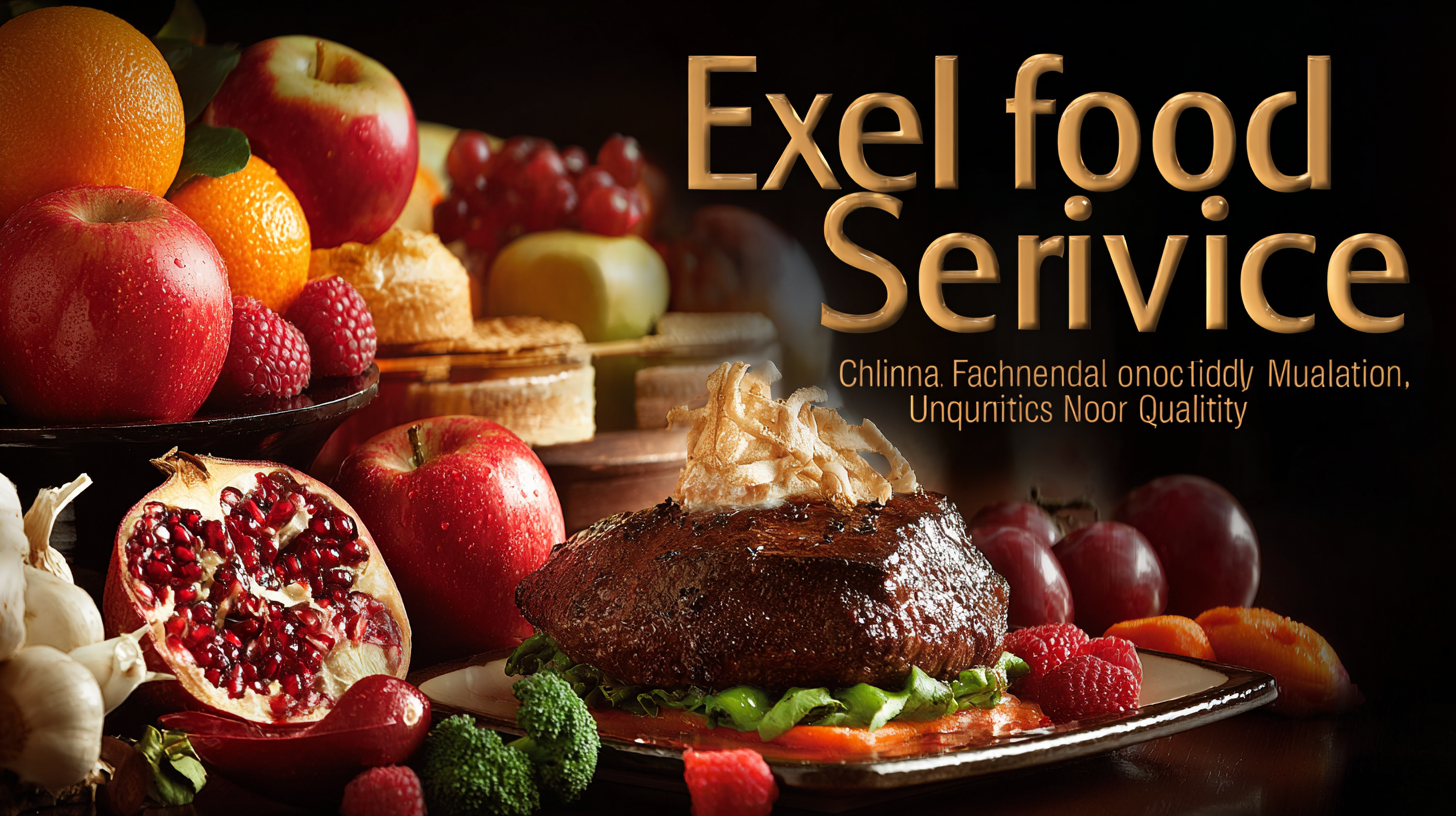Global Excellence in Food Service: China’s Leading Manufacturer for Unmatched Quality
 In the rapidly evolving landscape of the global food service industry, China's leading manufacturers are setting
unparalleled standards in quality and innovation.
As food service demands become more sophisticated, companies are rising to the challenge by delivering
top-tier products that not only meet but exceed customer expectations.
This blog explores the detailed technical specifications of these exceptional products, shedding light on how
Chinese manufacturers leverage cutting-edge technology and stringent quality
controls to maintain their competitive edge. By focusing on unmatched quality and performance, these manufacturers
not only enhance the operational efficiency of food service establishments but also elevate the dining experience
for consumers worldwide.
In the rapidly evolving landscape of the global food service industry, China's leading manufacturers are setting
unparalleled standards in quality and innovation.
As food service demands become more sophisticated, companies are rising to the challenge by delivering
top-tier products that not only meet but exceed customer expectations.
This blog explores the detailed technical specifications of these exceptional products, shedding light on how
Chinese manufacturers leverage cutting-edge technology and stringent quality
controls to maintain their competitive edge. By focusing on unmatched quality and performance, these manufacturers
not only enhance the operational efficiency of food service establishments but also elevate the dining experience
for consumers worldwide.
Join us as we dive into the remarkable achievements and technological advancements that define excellence in the food service sector, showcasing the products that are revolutionizing this essential industry.
Understanding Import and Export Certifications in China's Food Service Industry
In the dynamic landscape of China's food service industry, understanding import and export certifications is vital for maintaining quality standards. With the country’s remarkable growth in the food sector, particularly a GDP increase of 4.6% year-on-year in Q3 2024, the need for stringent regulatory compliance has never been greater. The complexities of China's food import system can be overwhelming. According to recent reports, over 60% of foreign food companies cited regulatory challenges as a significant barrier to market entry.
Ensuring compliance with China's intricate F&B regulatory system is essential for safeguarding the quality and safety of imported food products. The seafood sector, for instance, is subject to rigorous inspection protocols, with programs dedicated to evaluating, grading, and certifying seafood products. As China continues to enhance its trade ties, particularly with countries like Brazil, the potential for foreign businesses to thrive in this market hinges on their understanding of these certification requirements. As highlighted by opportunities emerging from events such as the 2024 China International Import Expo, companies that navigate these certifications effectively will be positioned to leverage growth within China’s thriving food service sector.
Global Excellence in Food Service: China’s Leading Manufacturer for Unmatched Quality - Understanding Import and Export Certifications in China's Food Service Industry
| Certification Type | Description | Authority | Validity Period |
|---|---|---|---|
| HACCP | Hazard Analysis Critical Control Point | Ministry of Agriculture | 3 years |
| ISO 22000 | Food Safety Management System | International Organization for Standardization | 3 years |
| FSSC 22000 | Food Safety Certification System | Food Safety System Certification Foundation | 3 years |
| NSF | National Sanitation Foundation Certification | NSF International | 1 year |
| Export Health Certificate | Certificate for export of food products confirming health standards | General Administration of Quality Supervision, Inspection and Quarantine | Varies by product |
Key Quality Standards for Food Service Equipment Manufacturing in China
In today's competitive landscape, China's food service equipment manufacturing industry stands out for its commitment to quality standards that align with global excellence. The recently released "Quality Power Construction Outline" by the Central Committee and State Council emphasizes a systematic approach to quality enhancement across various sectors, including food service. This strategic framework aims to ensure that manufacturers adhere to stringent quality controls, directly impacting the safety and efficiency of food service operations.
According to industry reports, the market for food service equipment in China is projected to grow by approximately 8% annually over the next five years, driven by increasing consumer demand for high-quality dining experiences. Compliance with international quality standards, such as ISO 9001, has become essential for manufacturers aiming to expand their presence in both domestic and international markets. As company leaders prioritize technological innovation and sustainable practices, they also focus on implementing rigorous quality management systems to guarantee unmatched quality and reliability in their products.
Step-by-Step Guide to Navigating China's Food Service Certification Process
Navigating the food service certification process in China can appear daunting, yet understanding the essential steps is critical for manufacturers seeking compliance and market entry. China’s food service industry continues to grow, with projected market revenues reaching approximately $800 billion by 2025, driven by increased consumer demand for safe and high-quality food products. Implementing proper certification not only aligns with national regulations but also enhances brand credibility.
Tip: Begin your certification journey by familiarizing yourself with local regulations and standards, such as the Food Safety Law of the People’s Republic of China. It is essential to compile all necessary documentation early to streamline your application process.
Moreover, recent movements in global food safety, like the introduction of the General Product Safety Regulation (GPSR) in the EU, emphasize the importance of rigorous compliance standards. Chinese manufacturers looking to export must also stay updated on international regulations to ensure their products meet both safety and quality benchmarks. Engaging with industry experts can provide invaluable insights, making the compliance process more efficient.
Tip: Consider partnering with local consultants who specialize in food safety regulations to gain a deeper understanding and ensure compliance with both domestic and international standards.
The Impact of Certification on Global Trade Opportunities for Chinese Manufacturers
The landscape of global trade is increasingly influenced by certifications that guarantee product quality and safety. For Chinese manufacturers in the food service industry, obtaining internationally recognized certifications can significantly enhance their market opportunities. This shift not only builds consumer trust but also aligns with global regulatory standards, making their products more appealing in competitive markets.

Tips for manufacturers looking to improve their certification standing include thoroughly researching the specific certifications relevant to their target markets. This understanding allows them to streamline their production processes and ensure compliance with international safety standards. Additionally, investing in training for employees on quality control measures can further bolster their credentials.
Moreover, it is essential to maintain transparency throughout the certification process. Establishing a clear communication channel with certifying bodies can mitigate misunderstandings and expedite approval. Manufacturers should also consider joining industry associations that offer resources and advocacy, providing networking opportunities that can support their certification endeavors and international expansion goals.
Best Practices for Maintaining Quality in Food Service Production and Export
Maintaining quality in food service production and export is paramount for ensuring customer satisfaction and compliance with international standards. According to the Food and Agriculture Organization (FAO), a staggering 1.3 billion tons of food is wasted each year, highlighting the need for robust quality assurance practices. Leading manufacturers in China are adopting best practices to mitigate this issue, focusing on rigorous hygiene protocols and efficient supply chain management. By implementing Real-Time Quality Monitoring (RTQM) systems, companies can enhance product safety and freshness, directly addressing the concerns posed by food spoilage.
Additionally, investment in advanced technologies such as blockchain for traceability and AI for predictive analysis is becoming increasingly crucial. A report by MarketsandMarkets indicates that the global food traceability market is projected to reach $20.2 billion by 2025, driven by consumer demand for transparency and safety. Chinese manufacturers are leveraging these innovations to not only ensure high quality but also to build trust with their international clientele. This commitment to excellence positions them as leaders in the global food service sector, capable of meeting and exceeding both local and global quality standards.

